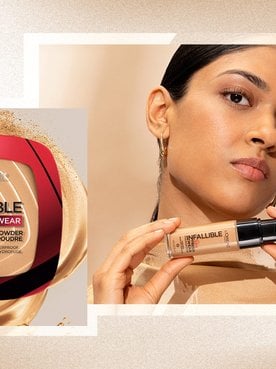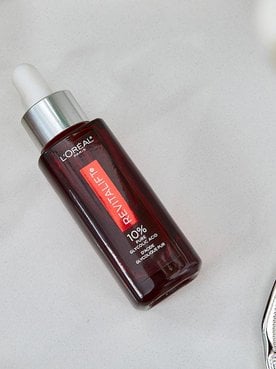Face Serum FAQs
What Is a Facial Serum?
What Does Serum Do for Your Face?
Facial serums are powerhouses in skincare, each meticulously formulated to target specific skin concerns, meaning what a serum does for your face depends on its unique blend of active ingredients. For instance, if you're looking to tackle dark spots, uneven skin tone, or dullness, serums containing ingredients like Vitamin C or Glycolic Acid are ideal. These work to brighten the complexion and promote cell turnover, revealing a more radiant and even appearance. The L'Oréal Paris Revitalift Derm Intensives 10% Pure Vitamin C Serum is a prime example, designed to restore radiance and visibly reduce dark spots over time. Similarly, the L'Oréal Paris Revitalift Derm Intensives 10% Pure Glycolic Acid Serum can help resurface the skin and minimize the look of dark spots.
When it comes to addressing signs of aging such as wrinkles, fine lines, or a loss of skin elasticity, anti-aging face serums come to the forefront. These often feature ingredients like Retinol, Peptides, or concentrated Hyaluronic Acid. For instance, the L'Oréal Paris Revitalift Derm Intensives 0.3% Pure Retinol Night Serum is proven to significantly reduce the appearance of deep wrinkles and smooth skin texture. For intense hydration and a plumping effect that can visibly reduce the look of fine lines, the L'Oréal Paris Revitalift Derm Intensives 1.5% Pure Hyaluronic Acid Serum is a go-to, as Hyaluronic Acid helps skin retain moisture, improving its suppleness.
In essence, a serum's role is to act as a focused treatment. By choosing a serum tailored to your specific skin needs, you can effectively target and improve concerns from hydration and radiance to firmness and wrinkle reduction, paving the way for healthier, more youthful-looking skin.
How Do You Choose a Face Serum?
Choosing the right face serum is all about understanding your skin's unique needs and concerns. The key is to identify what you want to improve, and then select a serum with active ingredients specifically formulated to address those issues.
•If your primary concern is hydration and plumping dry or dehydrated skin, look for hydrating serums rich in Hyaluronic Acid. This powerful humectant draws moisture into the skin, leaving it feeling supple and smooth. The L'Oréal Paris Revitalift Derm Intensives 1.5% Pure Hyaluronic Acid Serum is an excellent choice for intense hydration and visibly reducing fine lines caused by dryness. Another great choice is the Collagen Moisture Filler Moisture Bounce Serum, with collagen, glycerin, and squalene.
•For those targeting signs of aging like fine lines, wrinkles, and loss of firmness, anti-aging serums are your best bet. Ingredients like Retinol are highly effective for cell turnover and collagen production. Consider the L'Oréal Paris Revitalift Derm Intensives 0.3% Pure Retinol Night Serum to significantly reduce deep wrinkles and improve skin texture. Another great choice for anti-aging is the Age Perfect Cell Renewal Anti-Aging Midnight Serum with antioxidants for skin revitalization.
•If dullness, uneven skin tone, or dark spots are your main concerns, seek out face serum for bright skin with brightening and exfoliating properties. Vitamin C is a powerful antioxidant that helps brighten the complexion and protect against environmental damage. The L'Oréal Paris Revitalift Derm Intensives 10% Pure Vitamin C Serum can help restore radiance. Glycolic Acid, an AHA, gently exfoliates to reveal a more even and luminous skin tone, and the L'Oréal Paris Revitalift Derm Intensives 10% Pure Glycolic Acid Serum is great for this purpose. Finally, Niacinamide is a powerhouse ingredient for reducing dark spots, sun spots, age spots, and post-acne marks, making Bright Reveal 12% [Niacinamide + Amino Sulfonic + Ferulic Acid] Dark Spot Serum a must-try.
•For a little bit of everything, try Revitalift Triple-Power Age Defying Serum with Tri-Peptides, Hyaluronic Acid, and Vitamin C for brightening, anti-aging, and hydration.
Always introduce new serums gradually and observe how your skin responds. Consistency is key for seeing results.
Which Serum Is Best for Each Skin Type?
Choosing the best face serum hinges on understanding your specific skin type and its unique needs. Use this guide to help tailor your serum choice to ensure optimal results and address your primary concerns effectively:
•Face Serum for Dry Skin: For dry skin, the focus should be on intense hydration. Look for serums packed with humectants like Hyaluronic Acid, Glycerin, or Ceramides. These ingredients attract and lock moisture into the skin, plumping it up and reducing the appearance of fine lines caused by dehydration. Good choices include Revitalift Derm Intensives 1.5% Pure Hyaluronic Acid Serum, Collagen Moisture Filler Moisture Bounce Serum, and Revitalift Derm Intensives 10% Pure Glycolic Acid Serum.
•Face Serum for Oily or Acne-Prone Skin: If you have oily or acne-prone skin, opt for lightweight, non-comedogenic serums that help regulate oil production and combat breakouts. Ingredients like Salicylic Acid are excellent for exfoliating pores, while Niacinamide can help reduce inflammation and minimize pore appearance. Avoid heavy, oil-based serums that might exacerbate oiliness. We recommend Bright Reveal 12% [Niacinamide + Amino Sulfonic + Ferulic Acid] Dark Spot Serum and Revitalift 12% Pure Vitamin C + E + Salicylic Acid Serum.
•Face Serum for Mature Skin: Mature skin benefits greatly from serums that target signs of aging. Seek out formulas with powerful anti-aging ingredients such as Retinol to promote cell turnover and reduce wrinkles, Peptides to boost collagen production and improve firmness, or rich antioxidants like Vitamin C to protect against environmental damage and brighten the complexion. We love Age Perfect Skin Care Serum Le Duo, Age Perfect Skin Care Cell Renewal Anti-Aging Midnight Serum, and Revitalift Derm Intensives 0.3% Pure Retinol Night Serum.
•Face Serum for Combination Skin: For combination skin, the approach can be more nuanced. You might consider using different serums on different areas (e.g., a hydrating serum on dry patches and a purifying serum on oily zones). Alternatively, look for balanced serums that offer a blend of benefits, such as those with Niacinamide, which can help normalize oil production while still providing hydration and soothing effects. Revitalift Triple Power Age-Defying Serum delivers a host of benefits for all skin types, making it a great choice for combination skin.
What Ingredient Should You Look for in a Face Serum?
When selecting a face serum, understanding the key active ingredients and their benefits is crucial for targeting your specific skin concerns. Here's an overview of some of the most common and effective ingredients you'll find:
•Hyaluronic Acid: This is a powerful humectant, meaning it attracts and holds onto moisture from the environment, delivering intense hydration to the skin. It can hold up to 1,000 times its weight in water, making it excellent for plumping the skin, reducing the appearance of fine lines caused by dehydration, and improving overall skin suppleness.
•Vitamin C (L-Ascorbic Acid and derivatives): A potent antioxidant, Vitamin C is celebrated for its ability to brighten the complexion, reduce the appearance of dark spots and hyperpigmentation, and protect the skin from environmental damage caused by free radicals. It also plays a role in stimulating collagen production, leading to firmer, more youthful-looking skin.
•Retinol (Vitamin A derivative): Considered the gold standard in anti-aging, Retinol works by accelerating skin cell turnover, which helps to reduce the appearance of fine lines, wrinkles, and hyperpigmentation. It also stimulates collagen and elastin production, improving skin firmness and elasticity. Due to its potency, it's often best introduced gradually into a routine.
•Niacinamide (Vitamin B3): A versatile ingredient, Niacinamide offers a multitude of benefits. It helps to strengthen the skin's barrier function, reduce redness and inflammation, minimize the appearance of pores, and regulate oil production. It's also known to improve skin tone and texture.
•Glycolic Acid (AHA - Alpha Hydroxy Acid): This is an exfoliant that helps to shed dead skin cells from the surface, revealing brighter, smoother skin underneath. It's effective for improving skin texture, reducing the appearance of fine lines, and fading dark spots and hyperpigmentation.
•Peptides: These are short chains of amino acids that act as building blocks for proteins like collagen and elastin. When applied topically, different types of peptides can signal the skin to produce more collagen, leading to improved firmness, reduced wrinkles, and enhanced skin elasticity.
By understanding what each of these powerful ingredients does, you can make an informed choice to address your skin's unique needs and elevate your skincare routine.
How Do You Use a Face Serum?
Follow these simple steps to use face serum correctly and ensure maximum efficacy to allow potent ingredients to penetrate deeply:
1.Cleanse and Tone: Begin with a thoroughly cleansed face. After cleansing, if desired, apply your toner to balance your skin's pH and prepare it for the serum.
2.Apply to Damp Skin: For enhanced absorption, apply your serum to skin that is still slightly damp. This helps to lock in moisture and allows the active ingredients to penetrate more effectively.
3.Dispense a Small Amount: Serums are highly concentrated, so a little goes a long way. Typically, 2-3 drops or a single pump is sufficient for your entire face and neck.
4.Gentle Application: Gently pat the serum onto your face, neck, and décolletage using your fingertips. Avoid rubbing vigorously, as this can irritate the skin. Allow it to absorb for a minute or two.
5.Layering Serums (Optional): If you're using multiple serums, apply them from the thinnest consistency to the thickest. For example, a water-like hydrating serum would go on first, followed by a slightly thicker Vitamin C serum, and then an even richer anti-aging serum.
6.Follow with Moisturizer: Once the serum has fully absorbed, seal in its benefits by applying your regular moisturizer to lock in hydration and create a protective barrier.
When Should You Use a Face Serum?
Face serums are typically used twice daily, in both your morning and evening skincare routines, after cleansing and toning but before moisturizing. This allows the concentrated active ingredients to penetrate the skin efficiently without being blocked by heavier creams. The specific timing can depend on the serum's active ingredients:
•Morning Serums: Look for serums with antioxidants like Vitamin C to protect your skin from environmental aggressors throughout the day.
•Night Serums: Serums containing ingredients like Retinol or Glycolic Acid, which can increase sun sensitivity, are best applied at night. Always follow up with a broad-spectrum SPF 30+ during the day when using retinoids.
How Often Can You Use Face Serums?
How often you should use face serums depends on their active ingredients and concentration. Many serums, particularly those focused on hydration or daily antioxidant protection (like serums with Hyaluronic Acid or Vitamin C), are formulated for everyday use, both morning and night. However, serums containing more potent ingredients, such as Retinol or stronger exfoliating acids, may be recommended for use only a few times a week, especially when first introducing them to your routine, to allow your skin to adjust. Always consult the specific product instructions for the best and safest results, as formulations vary.
How Long Does It Take to See Results from a Facial Serum?
The time it takes to see results from a facial serum varies significantly depending on the active ingredients and the skin concern being addressed. For immediate concerns like hydration, you might notice plumping and a reduction in dryness within minutes or a few days of using a serum. However, for more complex issues such as reducing wrinkles, fading dark spots, or improving skin elasticity, consistent use over several weeks to a few months is typically required before noticeable improvements appear. Skin cell turnover cycles also play a role, making patience and regular application key for achieving the intended long-term benefits.
Can You Use a Serum under Makeup?
Yes, you can use face serum under makeup. Most facial serums, especially those with lightweight and fast-absorbing formulas, can be seamlessly incorporated into your pre-makeup routine. The key is to allow the serum to fully absorb into your skin (about 1-2 minutes) before you proceed with applying your moisturizer, letting it absorb fully before then applying primer or foundation. Ensuring complete absorption of each product prevents your makeup from pilling or looking patchy, providing a smooth canvas for an even application and helping your makeup last longer throughout the day.
Can You Use Face Serum If You Have Sensitive Skin?
Yes, individuals with sensitive skin can absolutely use face serums, but careful selection is key. Look for serums specifically formulated for sensitive skin, often labeled as hypoallergenic or fragrance-free. Prioritize gentle, hydrating, and soothing ingredients like Hyaluronic Acid or Niacinamide, which help strengthen the skin barrier and reduce irritation. Always perform a patch test on a small area of skin before applying a new serum to your entire face. The L'Oréal Paris Revitalift Derm Intensives 1.5% Pure Hyaluronic Acid Serum is generally well-tolerated by many skin types, including sensitive skin, due to its hydrating and plumping properties. Introduce any new product slowly and observe your skin's reaction.
Do Facial Serums Expire?
Yes, facial serums do expire. Like all skincare products, they have a shelf life, typically indicated by a "PAO" (Period After Opening) symbol on the packaging, which looks like an open jar with a number followed by 'M' (e.g., 12M for 12 months). Using an expired serum can lead to decreased efficacy, as the active ingredients may degrade and lose their potency over time. In some cases, expired products can even cause skin irritation or harbor bacteria. Always check the expiration date or PAO and discard any serum that has passed its prime or shows changes in color, texture, or smell.
Where Can You Buy L'Oreal Paris Facial Serums?
You can purchase L’Oréal Paris face serums in-person at your local drugstore, at grocery chains, or online through retailers like Amazon, Target, and Ulta Beauty. Click the “Buy Online” button on the face serums' individual product pages to see where to purchase your serums online, or use our Store Locator to find an in-store option to shop for facial serums near you.







